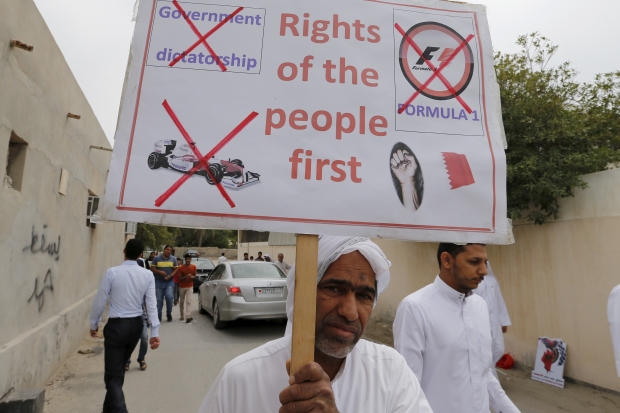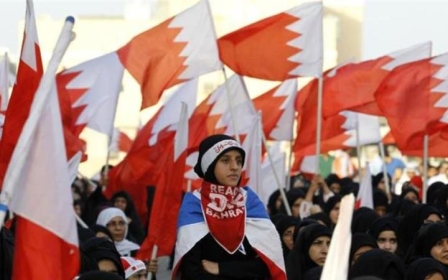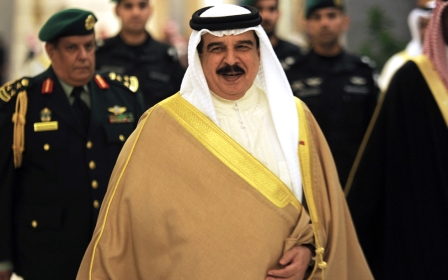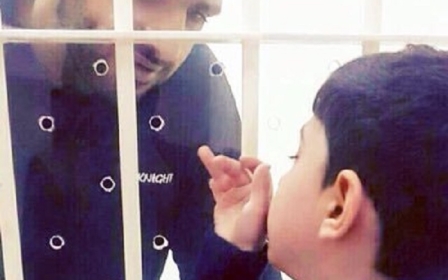Boris Johnson's silence on Bahrain's human rights abuses is deafening

Two men sit on death row in Bahrain. Their names are Mohammed Ramadan and Husain Moosa. They were convicted of the killing of a police officer in a bomb attack in 2014. They say, and international human rights organisations agree, that their confessions were extracted under torture. They say they are innocent.
Having exhausted all appeals, the two face execution at any moment. They - and their families - know that only a concerted effort from the international community can save them. The signs are not good. Neither the US nor the UK government has evinced interest in the case. And there is recent and chilling evidence to suggest that the sentence of the court will be carried out.
Unfair trial
In January of this year in the first executions of Bahraini citizens since 1996, three men were killed by firing squad. They too were charged and convicted of the murder of police officers. They too alleged their confessions were extracted under torture. At the time Amnesty International decried the fact that "this execution was carried out after an unfair trial and despite claims from the men that they were tortured in custody". A UN special rapporteur, Agnes Callamard, called it a case of "extrajudicial killings".
British Foreign Secretary Boris Johnson had this to say: "The UK is firmly opposed to the death penalty and it is our longstanding position to oppose capital sentences in all circumstances. The Bahraini authorities are fully aware of our position and I have raised the issue with the Bahraini government."
Why would the foreign secretary ruffle feathers with a complaint about unfair trials, tortured prisoners and the tarnished evidence that led to their deaths?
Especially after Bahrain's rulers had generously agreed to fund the building of a naval base for the UK, an offer that allowed the foreign secretary to boast that "Britain is back East of Suez". (If you want a peek at the full speech he gave in December 2016 you can find it here.)
Last week, Reprieve, the NGO that strives to save lives from death rows worldwide, said that after agreement 15 months ago from the Bahraini Ombudsman's Office to investigate the allegations of torture made by Mohammed Ramadan and Husain Moosa, the ombudsman could only report back that their case had been passed on to the Special Investigations Unit (SIU) who have not responded to requests for information. Reprieve and a group of British human rights lawyers noted that:
"Despite claiming to have opened investigations, neither the ombudsman nor the SIU have communicated any findings to Mr Ramadan, Mr Moosa, their lawyer or their families. This too constitutes a serious breach of international law."
Police reform
Those two institutions, the Ombudsman’s Office and the SIU, had been set up in the wake of a damning report commissioned by Bahrain's king and charged with examining events in 2011 that resulted in the brutal crushing of a pro-democracy movement. The Bahrain Independent Commission of Inquiry (BICI) proved conclusively that the police and security forces behaved with extreme violence and great impunity against mostly peaceful protesters.
Reform of the police was a central recommendation of the report, which was accepted in full by the king, and towards that end the British government committed millions of pounds of support. Despite ongoing evidence of human rights abuses, that support continues to this day, to the tune of roughly $2.78m a year.
While the men on death row and their families desperately wait to hear something, anything, our foreign secretary has nothing to say
When I was last allowed into Bahrain in 2013 – most foreign reporters are now routinely denied entry - I made a film for the BBC about the extent to which real reform of the police was happening on the ground. I interviewed the ombudsman who assured me that his office was not simply expensive window dressing designed to assuage any concerns that friends and allies - like the UK and the United States - might have. "Do not judge us yet, wait," he implored.
I asked him about a case we had uncovered of a young Bahraini tortured into a false confession while in detention. The police officer involved had brazenly posted a film online of the interrogation in which the clearly terrified victim admitted to taking money from the two most senior clerics in the Shia community to kill police officers.
False confessions
It was clear from the video that he had been coached and beaten into making the "confession". When, during the making of the film, I asked the chief of police about the video, he said that he was shocked and told me it would be dealt with appropriately. And I was assured by the ombudsman that his office would launch an investigation. To my knowledge, it never did.
At the end of the film I asked the father of another young man, who had been arrested, beaten, forced to sign a false confession and jailed for four months, whether he would take his son's case to the ombudsman. He said: "No, it will achieve nothing."
This was a man who told me his wife had died after a canister of teargas, fired by the police, had hit their flat and set it ablaze."Many complaints have been made in the past," he said "and nothing has changed."
So while Reprieve waits to hear something, anything, while the men on death row and their families desperately wait to hear something, anything, our foreign secretary has nothing to say.
The British government has committed millions of pounds of support to police reform. Despite ongoing evidence of human rights abuses, that support continues to this day, to the tune of roughly $2.78m a year
Plenty to say about Brexit, lots of (questionable) claims of loyalty toward the prime minister, colourful huzzas about arms sales to the Middle East and warm relations with the Gulf states but two men sitting on death row in Bahrain whose allegations of torture have not been investigated by Bahraini institutions established with UK funding, sustained with UK training and annual stipends - on that Boris Johnson is silent.
His is a silence that should shame us all.
- Bill Law is a Middle East analyst and a specialist in Gulf affairs. He tweets @billlaw49.
The views expressed in this article belong to the author and do not necessarily reflect the editorial policy of Middle East Eye.
Photo: A protester holds a placard, which reads: "We will not forget our martyrs", as she shouts anti-government slogans during the funeral procession for Hassan al-Hayki, who was detained by authorities and died on Sunday, in Manama, Bahrain, 2 August 2016 (Reuters)
Middle East Eye propose une couverture et une analyse indépendantes et incomparables du Moyen-Orient, de l’Afrique du Nord et d’autres régions du monde. Pour en savoir plus sur la reprise de ce contenu et les frais qui s’appliquent, veuillez remplir ce formulaire [en anglais]. Pour en savoir plus sur MEE, cliquez ici [en anglais].






